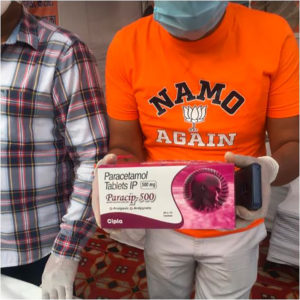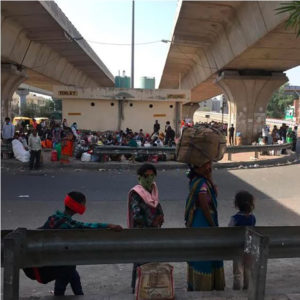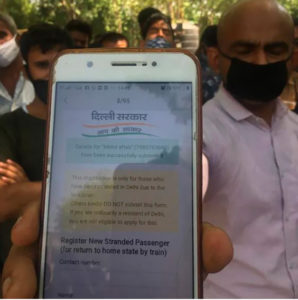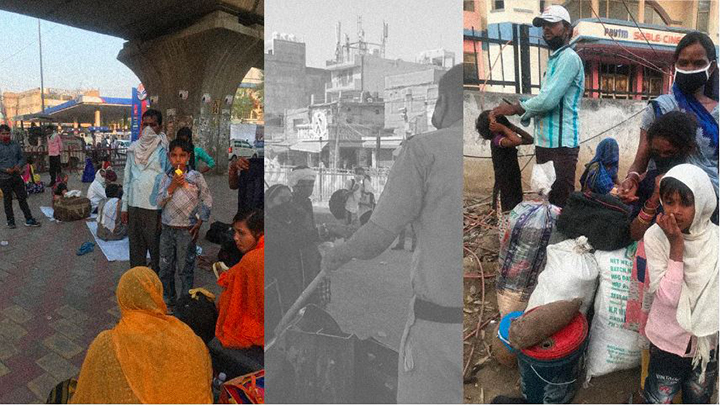A BJP worker pays out of his pocket to organise private vehicles, even as constables hustle the labourers across the border at dead of night
When there’s an event, even a Covid pandemic, can the Modi brand be far behind?
There’s a bustle at the Modi Rasoi, a makeshift tent, fluttering on the edge of the Mehrauli-Badarpur border. Here, Bharatiya Janata Party workers distribute packets of food and juice, mineral water, paracetamol tablets, and sanitary napkins to the teeming migrants who have collected in the shade of the zipping metro and highway overbridge.
The crowd, like anywhere else in the country, comprises hordes of emaciated, hungry families — mostly daily wagers who have not worked for two months since the national lockdown was announced by Prime Minister Narendra Modi on March 24. They arrive with little children in tow, after walking miles and miles, carrying all their worldly belongings stuffed in bags, grouped at this border point between Delhi and Haryana, with Faridabad across the line.
In the Covid dystopian world, it’s stunning how expertly the desi information network bristles. All those who have arrived at Badarpur are heading towards Saharanpur, Etah, Jhansi and Agra, or to Gwalior in Madhya Pradesh. It’s as if there’s an official schedule for departure, but they’ve come only through word of mouth and with compatriots. They are mostly families who have come together from various bastis and clusters in Delhi, from Dwarka, Nangloi, Kirti Nagar, and so on.
They are masons, tile-fitters, bricklayers and construction labourers. They are unlike the thousands of young men with their backpacks and cheap smartphones who are crowding the borders on the north-east of Delhi. In Badarpur, on the opposite end, in south-east Delhi, the families are not tech-savvy enough to register for online tickets on the special Shramik trains taking migrants home, nor do they have any idea what awaits across the Delhi-Haryana border.

Shivam and Sunita with their three little children have walked from Dwarka, where they work as construction labourers. They are headed to Kailashpur in Saharanpur, Uttar Pradesh.
“We heard that buses are going to start today,” Shivam says anxiously, as he looks around for some confirmation, but there’s none. Many have arrived in small pick-up vans, who are doing the daily run of transporting families to the border, charging as little as Rs 20 per person.
Ram Singh and his brood of wife and daughters loll around as they open their food packets distributed at the Modi Rasoi, which contain a packet of chana, namkeen, and bananas on the side. They have arrived burned and baked, but are fired and possessed by a dogged wish to go home.
It’s a power that propels them with an accuracy that is daring and stunning in its grit and desolation — of being abandoned and forsaken.

Mukesh Pradhan is livid at Delhi chief minister Arvind Kejriwal for shunning the migrant families at the Badarpur border. Pradhan is a mandal head and a frenetic BJP worker to boot.
“Where is the Aam Aadmi Party government and its party workers in this area? They have done nothing to help the people here — there are no toilets, refreshments, shelter homes, nothing,” he says. “Where are the buses that would take them across the border, or to the various registration centres the Delhi government has opened? Kejriwal is lying when he says he is doing a lot for the migrants.”
Typically, Badarpur is caught between two opposing parties, the AAP and BJP. The local MLA, Ramvir Singh Bhiduri from the BJP, is a four-time winner, and is leader of the Opposition in the present Assembly. Bhiduri, 58, is a Gujjar leader. He sprang from the Akhil Bharatiya Vidyarthi Parishad, the student arm of the Rashtriya Swayamsevak Sangh, but first won on a Janata Dal ticket in 1993. He then joined the Nationalist Congress Party and finally the BJP, when he won twice in the last three elections.
Bhiduri defeated his AAP rival, Ram Singh Netaji. The latter is nowhere on the scene, nor is the party or its workers anywhere in sight. Bhiduri’s three-decade-old clout is visible on hoardings everywhere, whether he is gracing a wedding in Surajkund or opening a shop or school.
For the desperate migrants, it’s only Mukesh Pradhan and his team who are organising private transport to ferry them to Chattarpur, where there is a Delhi government registration centre, or dropping them off at the border with the hope that some truck or bus will take them to their destination.
“I’m using my own personal resources to ferry them across the border. I actually got my van to drop off three families at Agra this morning as they were desperate and crying for help,” Pradhan says with genuine anguish, even as he barks orders to the drivers and hands over water to the men.
Nearby, his colleague Kiran Tripathi, head of the BJP Mahila Mandal, distributes sanitary napkins to the women in the queue. “There is no Delhi government here,” adds Tripathi.
But why can’t Bhiduri, who was out on his rounds, use his clout as leader of the Opposition to force the Kejriwal government to open up schools as shelter homes and registration centres in Badarpur, and organise buses to ply migrants to the border?
Pradhan insists on blaming Kejriwal but is candid when he says that the BJP governments in Haryana and Uttar Pradesh can also do a lot more to help migrants when they arrive across the border. “I wish there were buses waiting to take the migrants and their families to their homes,” he says wistfully.
Meanwhile, at the border itself, there are more families crowding under the bridge. The approach of the state police on either side of the border starkly explains the barbarity of the situation. While the Delhi police personnel lounge in their Gypsy vehicles with nothing much to do, the Haryana police constables wield lathis to push back anyone who dares approach the border, even as they beseech to be let across.

A constable demands ID proof from those who insist they live in Faridabad across the line, otherwise they must back off immediately.
So, what happens to all those migrants assembled in no-man’s land under the overbridge?
As a Haryana constable explained, “We cannot allow them to cross over in the daytime. However, later, as evening sets in, we look the other way as they pile into trucks and transport vans going through the state border all night. Most of the truck drivers are sympathetic and pick up the migrants and drop them off at various points on their way to Uttar Pradesh and Madhya Pradesh.”
The policeman is compassionate when he says he has to allow it on humanitarian grounds and agrees that his state chief minister, Manohar Lal Khattar, could do so much to help these poor hapless labourers reach home.
“It takes so little for the government to organise buses and food for them. Where have we lost our humanity?” he says, looking at the pool of empty eyes before him.
It’s also the ploy that Mukesh Pradhan and his band of men use to send the people across the border, hoping they’ll soon be on their way home.
***
Chattarpur’s Pratimik Kanya Vidyalay, a government primary school for girls, was one of the many schools opened in Delhi three days ago for migrants who are fortunate to have been registered for a seat on the Shramik trains to various states.
Schoolteachers Vinita Ahlawat and Abha Gupta are among the 16 teachers who have been summoned by the Delhi government to help migrants fill their forms. The migrants are then screened for Covid-19 by health workers, and readied to be packed off to the snaking lines of DTC buses parked outside. The buses will take them to New Delhi railway station.
After almost two months, the Kejriwal government has finally moved its behemoth administration — from district collectors to sub-divisional magistrates, health officials to schoolteachers — to earmark schools and halls for shelters, medical check-ups, tokens and e-registration for buses and trains to Ladakh, Bihar and Uttar Pradesh. The Vidyalay’s campus is sprawling and jotted with trees, and there’s a hush of discipline and order as lines of young men and women wait in queues to enter the office doors.
Ahlawat says, “We must fill at least 1,000 forms a day. They are not so elaborate, mercifully, just the name, address, and destination.” She adds that this school “has been earmarked for Bhagalpur and Muzaffarnagar in Bihar”.
Mohammed Aftab, who worked in a wallet-making workshop in Paharganj, has been successfully registered for a seat on the Shramik train to Muzaffarnagar. After an agonising wait of almost two months, Aftab is desperate to go home, hopefully before Eid.
Says Aftab, “I used to earn Rs 4,000 a month but after the lockdown, we were stuck in our room which I shared with three others, with no work. However, my proprietor, who is also the landlord, allowed us to stay without rent and said to pay him Rs 1,000 a month in installments when we return to his factory.”
Aftab is looking forward to returning to Delhi, as there’s not much work back home.
Many others like Mohammed Shafatullah, a driver, is not registered to travel on a train but hopes to gatecrash one anyway based on the goodwill of officials.
As a bus readies to leave, it’s a feisty Maya Singh Bisht, a BJP municipal councilor from neighbouring Sangam Vihar, who leaps in to tell the exhausted passengers that “they must inform all who they can about the buses and trains that are leaving for your states”.
She thunders, “No one should be walking thousands of kilometres home from now” while handing a sanitary napkin to a shocked female labourer, even as her minion records the whole episode on his mobile camera. She drops the Modi mantra speech when I remind her that these buses are being organised by the Kejriwal government and not the central government. However, she says she has been working round the clock after Modi asked all party people to go out and help migrants.
You’ve got to hand it to the BJP for the sheer force of its dogged workers and the incessant whirring of its publicity machine.
Similarly, the snaking queues of buses and people outside the Delhi Institute of Pharmaceutical Sciences and Research, Mehrauli, has been designated for Shramik trains to Uttar Pradesh, apart from three luxury buses that are being readied for travel to Kargil in Ladakh.
The waiting crowd includes Mehboob Ali Azhar and his friends. all from Jamia Millia Islamia college, where they study films, art education, journalism and engineering.
Inside the institute, at a screening centre that’s been set up for Covid-19, IAS officer and sub-divisional magistrate (Saket) Ankita Mishra is making sure that all the registration papers of the people heading to Uttar Pradesh and Ladakh are in order. Mishra is part of the five committees of IAS officers instituted by Kejriwal to deal with the pandemic.
“Please be assured we will send you all home,” she tells the crowd of expectant daily wagers dutifully standing in line or squatting on the ground, as she and her team distribute bottles of water around. “We’ve already sent 4,000 people already,” she says, even as the buses for Kargil with excited students are being waved off on their three-day long journey.
***
Has the pandemic opened the country’s eyes to the millions of faceless, nameless, small and little people, who silently arrive in mammoth waves from the countryside to build our glitzy cities, shiny bridges and airports?
Even as they char in the blazing sun and crawl into ratholes in their monster construction sites at night, while building the swish, urban lives brick by brick?
You don’t have to drive for miles on highways and into the countryside to see them. The pathos and desolation of the labourer is in your backyard.
Just a street behind my residence, there are half a dozen 20-year-olds from Beghusarai, Bihar, at a construction site where an old bungalow is being torn down for a four-storey house. Dilip Kumar, Janardhan, CM Kumar (obviously a false name!), among others are afraid, confused, and perplexed about their trip back home. It’s been two months, and their thekedar (labour contractor) Pappu Chaurasiya has not paid them yet, but their builder (name concealed) has given them daily rations of dal, rice and vegetables, apart from an allowance for small expenses like soap.
Chaurasiya, who stays in a shiny big house in Nangloi, as the young men reveal, has now promised them money to reach home.
They get their information from Bindass Channel on YouTube, and scroll down “ABP News, Aaj Tak, India TV,” says Dilip Kumar. “No one has told us anything, we are waiting to know what to do next,” says Janardhan, in his shiny fake Adidas T-shirt.
Another senior worker, Ganga Ram, says he’s not going anywhere as he’d “rather stay back and earn money than waste 14 days in a quarantine centre in Bihar”. It does not shake the resolve and desperation of the youths to leave for home.

Postscript
There’s been an outburst of accusations and indignation in this pandemic about the “professional” and “ethical” duties of journalists while covering the humanitarian and health crisis in the country. Sarcastic and derisive cartoons of journalists whizzing away in their air-conditioned cars after interviewing famished migrants on highways, and wishing them a happy journey ahead, has prompted many from the fraternity to question whether only the story that should be of concern to the journalist, and not the fate of the subject.
So far, the fundamental duty of a journalist is to provide news that is accurate, unbiased and fair to shake up governments and institutions that serve public interest. But increasingly, in a post-truth world of big corporate media empires and monopolies, news has the risk of falling on the wayside, and the truth buried forever.
For instance, the plight of the migrants began in earnest on the news media soon after Modi declared the national lockdown on March 24, and looked threateningly embarrassing to the Modi government both in India and abroad. However, within a few days, the migrant story was brushed aside after the Tabligi Jamaat infection story erupted, and it became a headline-grabber for a couple of weeks, until heart-breaking stories of migrants getting killed walking on rail lines or in over-packed trucks that crashed on highways forced the stories to reappear in the headlines.
How does a journalist covering the migrant crisis move beyond recording and telling the story in a humanitarian crisis? A story is useless in the face of an indifferent, inept administration and government.
I worked it three ways:
First, it feels right to pay the ravaged and enfeebled people a small amount you speak to as a token of appreciation for their time and their story. It’s not charity but handing over a bit of dignity to them.
Two, it’s important to quiz officials present hard and fast, in the hope they will work better to help the affected people, more so in the presence of the latter.
Three, call the higher-ups if possible to ensure relief and rehabilitation reaches the affected people.
It was a satisfying end to the tragic story unfolding on the Badarpur border when my WhatsApp message to Delhi deputy chief minister Manish Sisodia elicited a response a few hours later, with pictures of DTC buses being sent to the border to pick up migrants to take them to shelter homes and registration offices.
Sisodia also said, “We take all such people to schools, make their lists, do their medical screening, and demand trains on need basis from the central government to send them home.”
Sisodia said the central government should send more trains as soon as possible. Delhi needs 100 trains a day; it has got only 25 so far. According to AAP officials, there are already four lakh migrants registered with the Delhi government train app, and the numbers are growing daily as people come to be aware through media and word of mouth.
Sisodia added in his message: “We have 24 schools near the Ghazipur border, as shelter homes. The DM is also sending some officials to the Badarpur border.”
Of course, when Mukesh Pradhan heard about it the next day, he said it was “a bunch of lies”. No one from Kejriwal’s government nor had any buses arrived, he said. “My work is still going on.”
www.newslaundry.com





